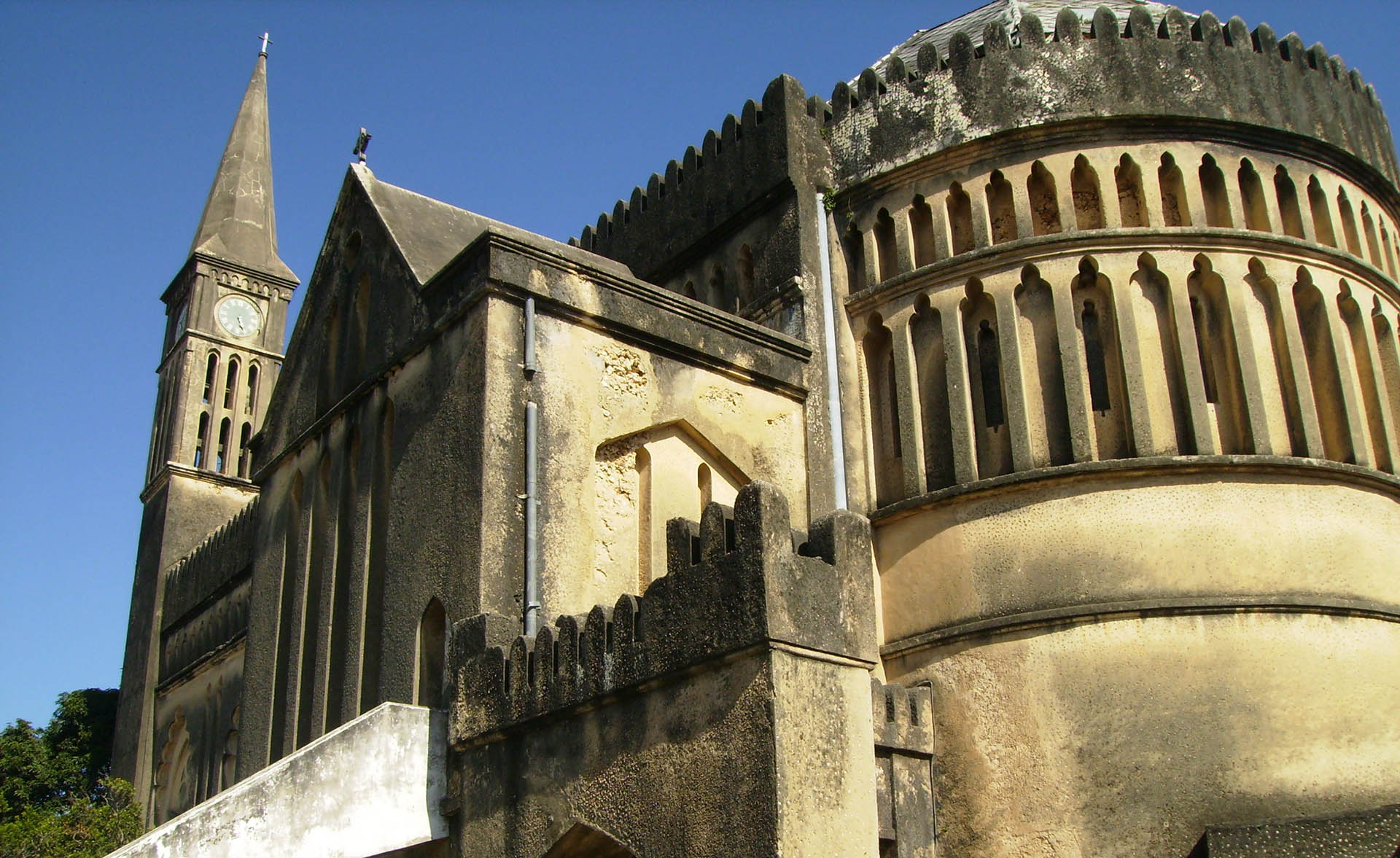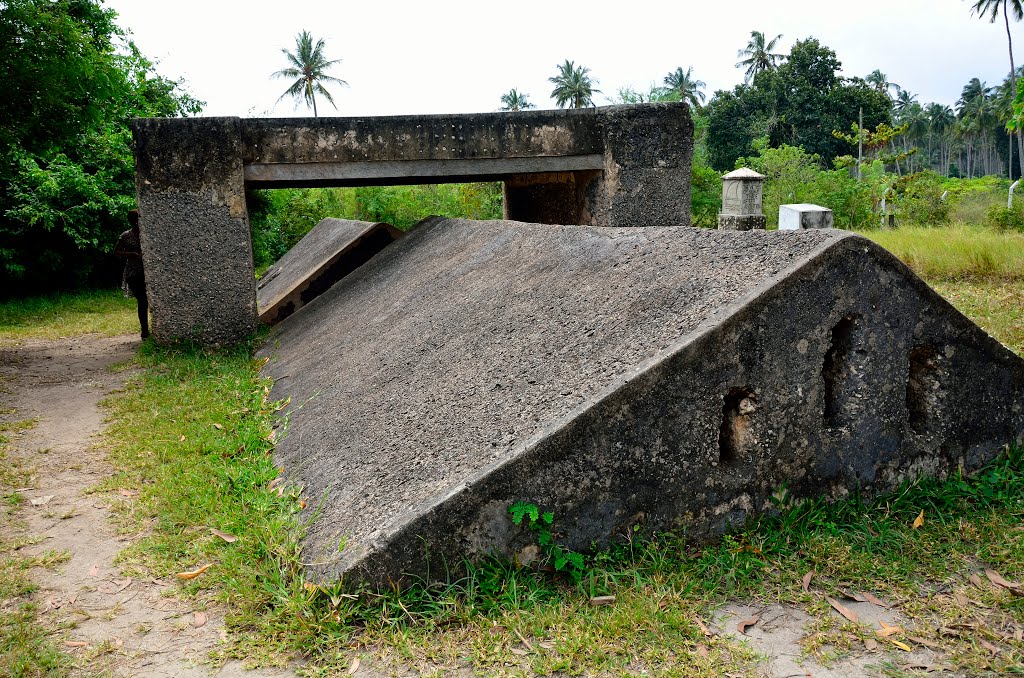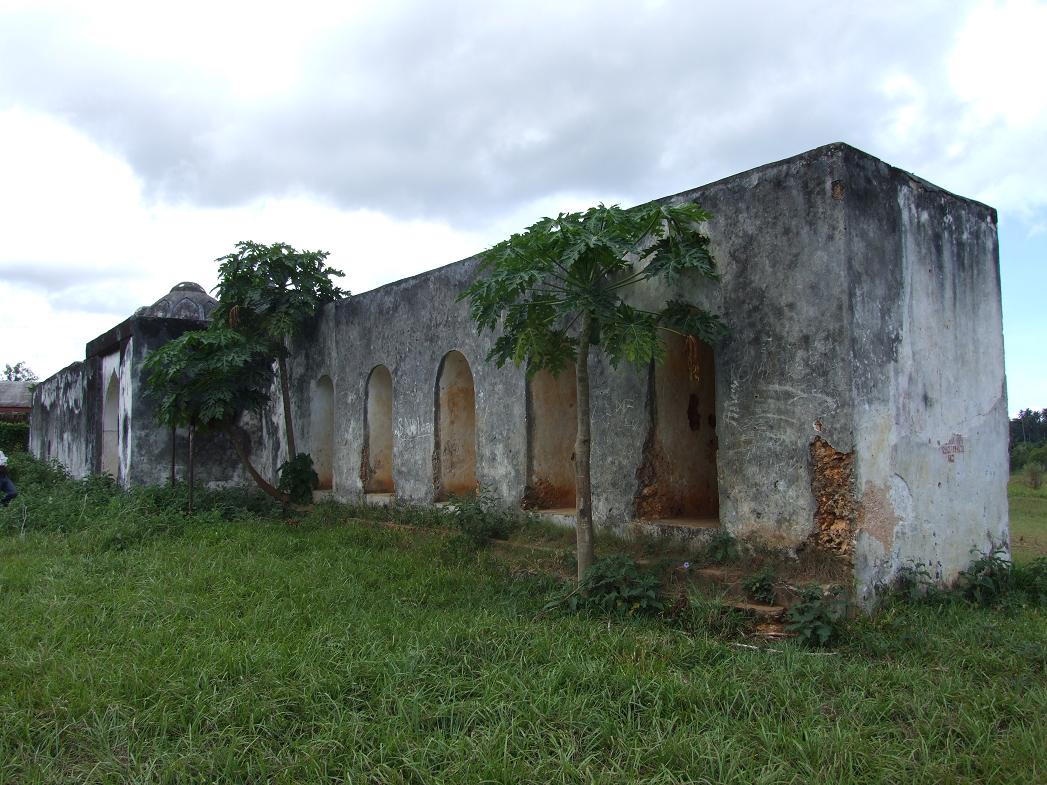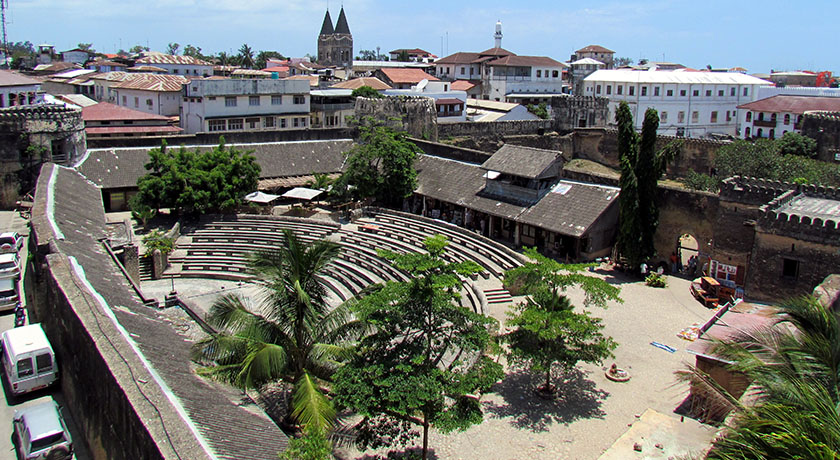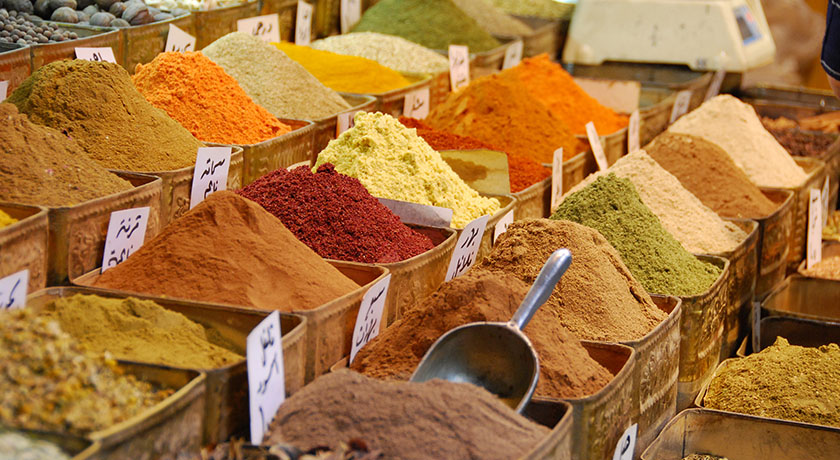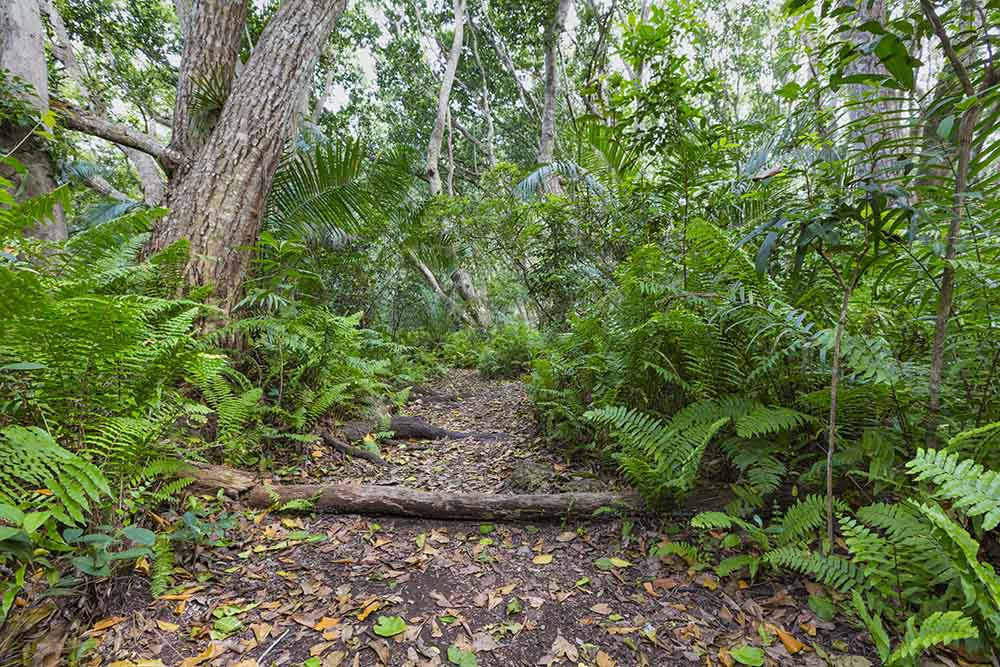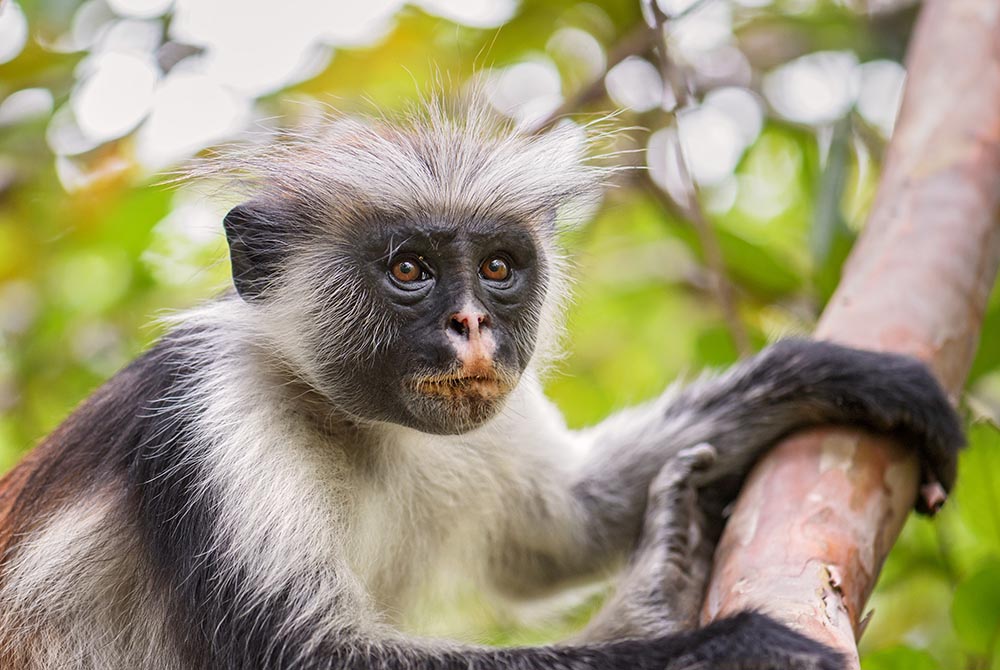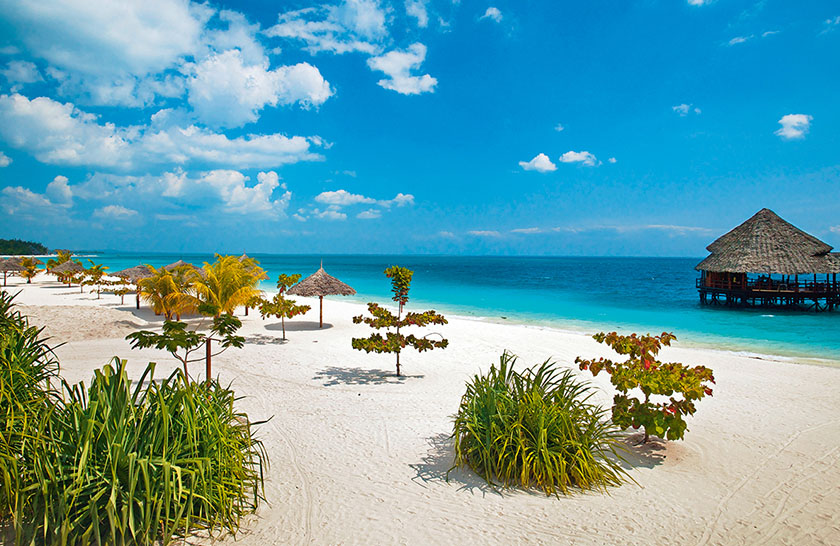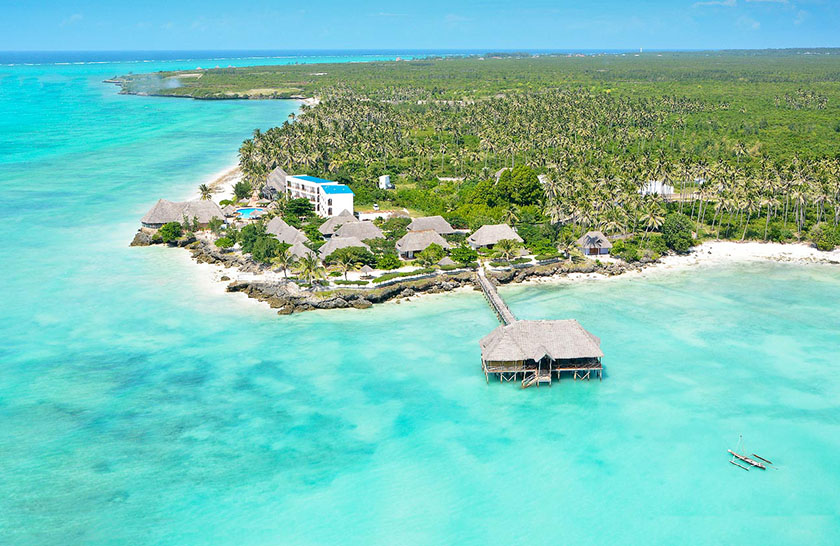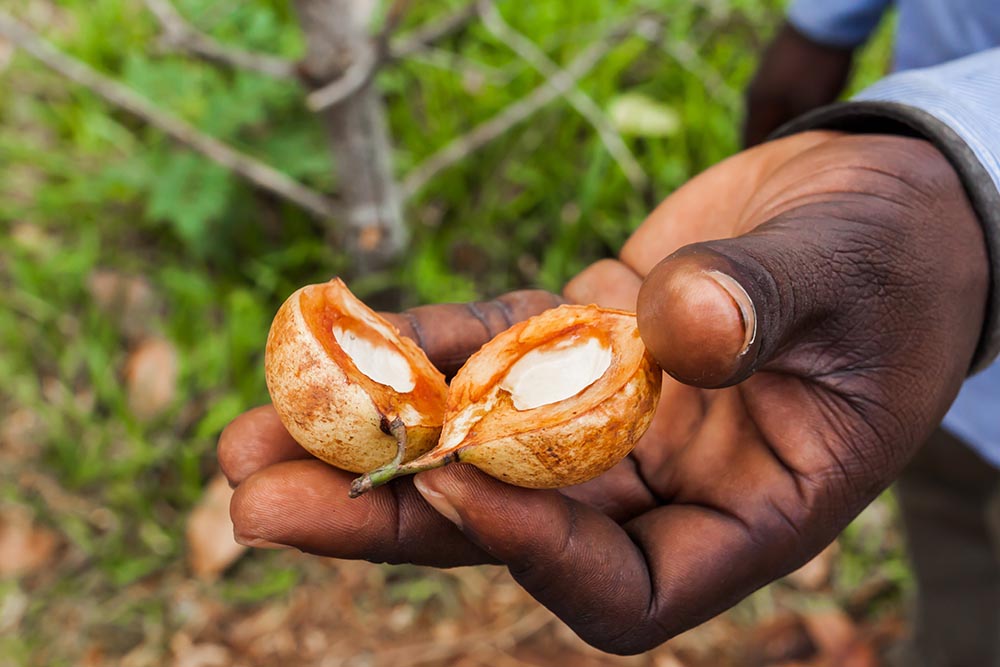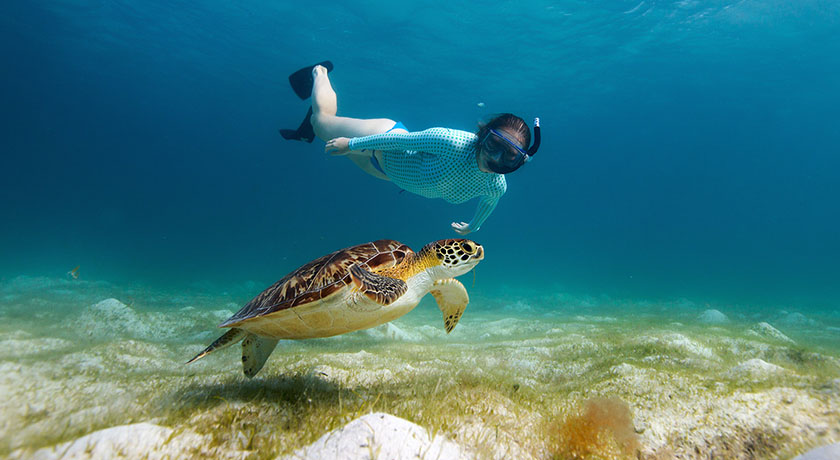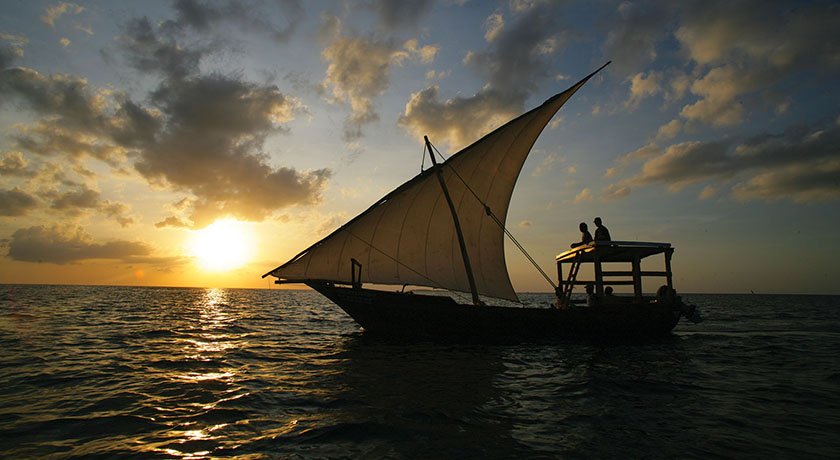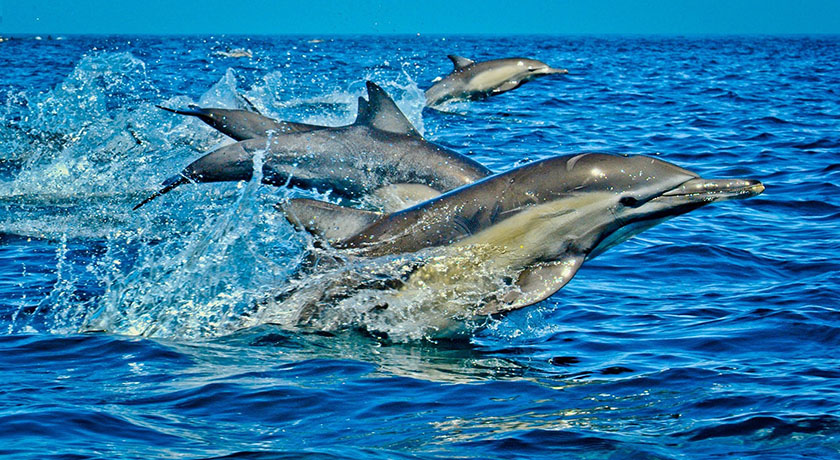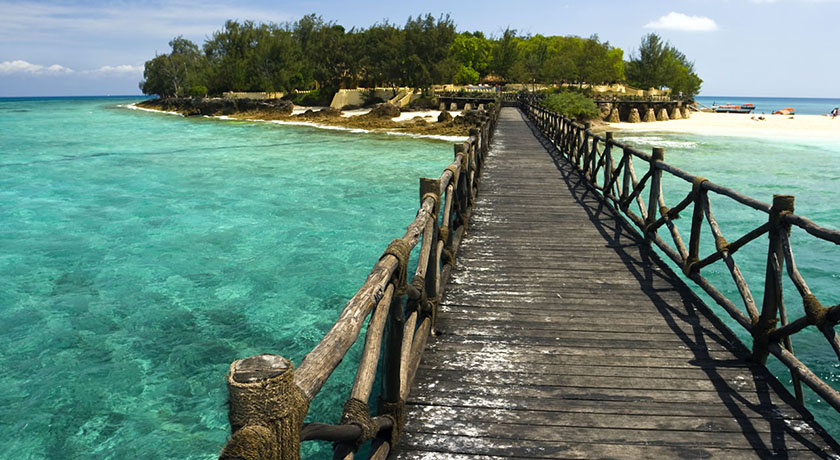If you are looking for a great beach holiday, to relax and unwind after a safari on the Tanzania mainland, Zanzibar might be the ideal island for you.
Zanzibar is a semi-autonomous part of Tanzania in East Africa. It is composed of the Zanzibar Archipelago in the Indian Ocean, 25–50 kilometres (16–31 mi) off the coast of the mainland, and consists of many small islands and two large ones: Unguja (the main island, referred to informally as Zanzibar) and Pemba. The capital is Zanzibar City, located on the island of Unguja. Its historic centre is Stone Town, which is a World Heritage Site.
Zanzibar’s main industries are spices, raffia, and tourism. In particular, the islands produce cloves, nutmeg, cinnamon, and black pepper. For this reason, the islands, together with Tanzania’s Mafia Island, are sometimes called the Spice Islands (a term also associated with the Maluku Islands in Indonesia). Zanzibar is the home of the endemic Zanzibar Red Colobus Monkey, the Zanzibar Servaline Genet, and the (possibly extinct) Zanzibar Leopard.
History
Zanzibar has lured traders, adventurers, plunderers and explorers to its shores for centuries. The Assyrians, Sumerians, Egyptians, Phoenicians, Indians, Chinese, Persians, Portuguese, Omani Arabs, Dutch and English have all been here at one time or another. Some, particularly the Shirazi Persians and Omani Arabs, stayed to settle and rule. With this influence, Zanzibar has become predominantly Islamic (97%) – the remaining 3% is made up of Christians, Hindus and Sikhs. The earliest visitors to Zanzibar were Arab traders who are said to have arrived in the 8th century. The earliest building that remains on Zanzibar is the mosque at Kizimkazi, which dates from 1107, and is a present-day tourist attraction.
For centuries the Arabs sailed with the monsoon winds from Oman to trade primarily in ivory, slaves and spices. The two main islands, Unguja (normally known as Zanzibar Island) and Pemba, provided an ideal base for the Omani Arabs, being relatively small, and therefore fairly easy to defend. Indeed, in 1832, Sultan Seyyid Said, of the Busaid dynasty that had emerged in Oman, moved his Sultanate from Muscat to Zanzibar, perhaps making it easier to protect, where he and his descendants ruled for over 130 years. Most of the wealth lay in the hands of the Arab community, who were the main landowners at that time.
[smart-grid row_height=”220″ last_row=”justify” margins=”0″ title=”false” share=”false”]
- OLYMPUS DIGITAL CAMERA
[/smart-grid]
Zanzibar Stone Town
Widespread intermarriage between Shirazis and Africans gave rise to a coastal community with distinctive features, and a language derived in part from Arabic, which became known as Swahili. The name Swahili comes from the Arab word sawahil, which means ‘coast’. The Zanzibar descendants of this group were not greatly involved in the lucrative slave, spice and ivory trades. Instead, they immersed themselves mainly in agriculture and fishing. Those Shirazi that did not intermarry retained their identity as a separate group. Indian traders arrived in connection with the spice and ivory trade, and quickly settled as shopkeepers, traders, skilled artisans and professionals. The British became involved in missionary and trading activities in East Africa, and attempting to suppress the slave trade centred in Zanzibar.
Goods from Britain docked here before they moved on to other parts of Africa. No longer very prosperous in the fiscal sense, the island has a wealth of historical monuments to visit which commemorate the African, British and particularly Arab influences- sultan’s palaces, cathedrals, mosques, fortresses and old colonial houses. “Spice Tours” are the ideal way to see the island’s historic sites and spice plantations. There is also a sanctuary for the rare Zanzibar duiker and the red colobus monkey in the protected Jozani Forest, just twenty-five kilometers from the town.
Language
The main language is Kiswahili. Even if you only use a few words whilst you are in Zanzibar you will make many friends. English is widely spoken and many people also speak Arabic. Other European languages such as French and Italian are known by some local people, especially around the tourist areas.
Population
The combined population of Zanzibar including Pemba is approx 1,000,000.
Religion
About 95% of the local population is Muslim. The remainder are Hindu or Christian and some with traditional beliefs. As well as many many mosques, Stone Town hosts an Anglican and a Catholic Cathedral and a Hindu Temple.
Time difference
3 hours ahead of GMT.
Electricity
Power system is 220-240 volts ac, plugs 13amp usually square pin.
Cultural aspects
The population of Zanzibar is predominantly Muslim with a rich Swahili culture. Because of religious and cultural traditions dress code is important, and men and women should dress appropriately when away from the beach, ie covering shoulders and legs too below the knees. Beachwear on the beach is fine, although nude or topless bathing is not tolerated.
Zanzibar-market-tour
When in villages or in Stone Town wearing beach wear would (and does) cause offence. Try to wear loose-fitting, non-transparent clothing when in public.
Zanzibari people are generally very warm, open and hospitable, and your respect for permission before taking photographs or filming local people is appreciated. Do not take photos or film at sensitive government sites including the State House, seaport, airport or military sites. If uncertain, it is always better to ask.
Public consumption of alcohol is not permissible, except in hotels and tourist areas, bars and some restaurants, where it is no problem.
Public displays of affection such as kissing are not customary and generally considered offensive, unless behind closed doors.
Local customs should respected. Mosques are sacred places an there is generally no entry to non-Muslims, unless accompanied by a person of the faith who can show you around except during the times for congregational prayer, which are five times daily.
When offering or accepting things, try and remember to offer and receive with your right hand. This is the hand which should also be used for eating.
[smart-grid row_height=”220″ last_row=”justify” margins=”0″ title=”false” share=”false”]
[/smart-grid]
Climate
Zanzibar experiences ideal holiday weather for most of the year, with the exception of April and May, which are seasonally subject to the long rains. Short rains can occur in November but are characterized by short showers, which do not last long.
The heat of summer is seasonally often calmed by windy conditions, resulting in pleasant sea breezes, particularly on the North and East coast. Being near the equator, the islands are warm all year round but officially summer and winter peak in December and June respectively. Zanzibar is blessed with an average of 7-8 hours of sunshine daily.
Seasons
SUMMER – November to May Hot, some humidity with some rains in November, May and June.
WINTER – June to October Warm with rains in June, otherwise sunny.
BEST – December to March and July to October
Money matters
The unit of local currency is the Tanzania Shilling (TSh). American dollars in cash or travellers cheques are acceptable in many places around town. Credit cards are still almost unknown in Zanzibar, and if you do manage to find a place to use them there will usually be a surcharge of at least 10%. Bartering about prices is common in Zanzibar marketplaces. Hotel, restaurant and tour operator prices are generally non-negotiable.
Shopping
A variety of locally produced crafts can be found in the shops and bazaars of StoneTown. Buying such goods benefits the local community so we encourage you to look out for such goodies.
Passports & Visas
All visitors must have a valid passport and visa to enter Tanzania. Visa fees vary according to the country you originate from. Visas can be obtained from Tanzania Diplomatic Representatives abroad.
Vaccination certificate
Visitors traveling to Tanzania don’t need anymore a valid international certificate of vaccination against Yellow Fever and Cholera!
Anti-malaria medication is recommended when traveling within East Africa. Anti-malaria tablets are recommended to be taken a few days prior to arrival, during your stay and for a short period after returning home.
[smart-grid row_height=”220″ last_row=”justify” margins=”0″ title=”false” share=”false”]
[/smart-grid]
ZANZIBAR PACKAGES:
2 Days Zanzibar Beach Holiday
This 2 Days Zanzibar beach holiday is an idyllic beach holiday island with charisma, coconut palms and powder-soft coral sands washed by cobalt clear sea
DAY 1
Arrive Zanzibar airport/ harbor transfer to Stone Town Hotel for check-inn; at 2:30pm have the stone town tour takes around the historical culture and architectural important town of Zanzibar with a century history.
It includes a visit to former slave market site, now stands as Anglican church built in 1871, town market, visit the Zanzibar beach holiday Memorial Museum, House of Wonder built in 1883 (Beit-Al-Ajab), old Arab Fort, Palace Museum, Old Indian dispensary (cultural center) to Maruhubi Palace ruins via Living Stone House. Dinner and overnight at your hotel.
DAY 2
Morning at 8:30am trip to spice and botanical tour, on this tour you will see and taste the tropical fruits, spices plantation or plots in the island. A variety of spices plants used as ornament, medicines, flowers, fruits and another interesting flora can be seen during spice tour and visit to Kidichi bath built in 1850 by the first Sultan for his wife Sheharzad (grand daughter of Fateh Ali Shah of Persia, and then transfer to harbour/ airport for departure.
You may choose to stay in between these hotels: Zanzibar coffee house, Asmini palace hotel, Dhow palace hotel.
3 days 2 nights Zanzibar Beach tour
This 3 days 2 nights Zanzibar Beach tour has apparently endless swathes of sand sweeping as far as the eye can see.
DAY 1
Arrive Zanzibar airport/ harbor transfer to Stone Town Hotel for check-inn; at 2:30pm have the stone town tour takes around the historical culture and architectural important town of Zanzibar with a century history.
It includes a visit to former slave market site, now stands as Anglican church built in 1871, town market, visit the Zanzibar Memorial Museum, House of Wonder built in 1883 (Beit-Al-Ajab), old Arab Fort, Palace Museum, Old Indian dispensary (cultural center) to Maruhubi Palace ruins via Living Stone House. Dinner and overnight at your hotel,
DAY 2
Morning at 8:30am trip to spiece and botanical touron this tour you will see and taste the tropical fruits, spices plantation or plots in the island. A variety of spices plants used as ornament, medicines, flowers, fruits and another interesting flora can be seen during spice tour and visit to Kidichi bath built in 1850 by the first Sultan for his wife Sheharzad (grand daughter of Fateh Ali Shah of Persia, and then transfer to harbour/ airport for departure.
4 Day Zanzibar Beach Vacation Program
DAY 1
Arrive Zanzibar airport/ harbour transfer to Stone Town Hotel for check –in at 2:30pm have a tip to prison island tour a home of giant tortoises. Flanged by an amazing beach of reef sanctuary, the island is ideal for swimming, snorkeling and beach relaxation return to stone town at 5:30pm for dinner and overnight.
DAY 2
After breakfast, stone town tour takes around the historical culture and architectural important town of Zanzibar with a century history.
It includes a visit to former slave market site, now stands as Anglican church built in 1871, town market, visit the ZanzibarMemorial Museum, House of Wonder built in 1883 (Beit – Al-Ajab), old Arab Fort, Palace Museum, Old Indian Dispensary (cultural center) at 2:00pm transfer to North or East coast hotel via Maruhubi Palace ruins, Living Stone House and to the spice and botanical touron this tour you will see and taste the tropical fruits, spices plantation or plots in the island. A variety of spices plants used as ornament, medicines, fruits and another interesting flora can be seen during spice tour and visit to Kidichi bath built in 1850 by the first Sultan for his wife Sheharzad (grand daughter of Fateh Ali Shah of Persia), dinner and overnight at your hotel.
DAY 3
Full day beach relax at the hotel, dinner and overnight.
DAY 4
Pick up from the hotel transfer to the harbour/ airport for departure.


